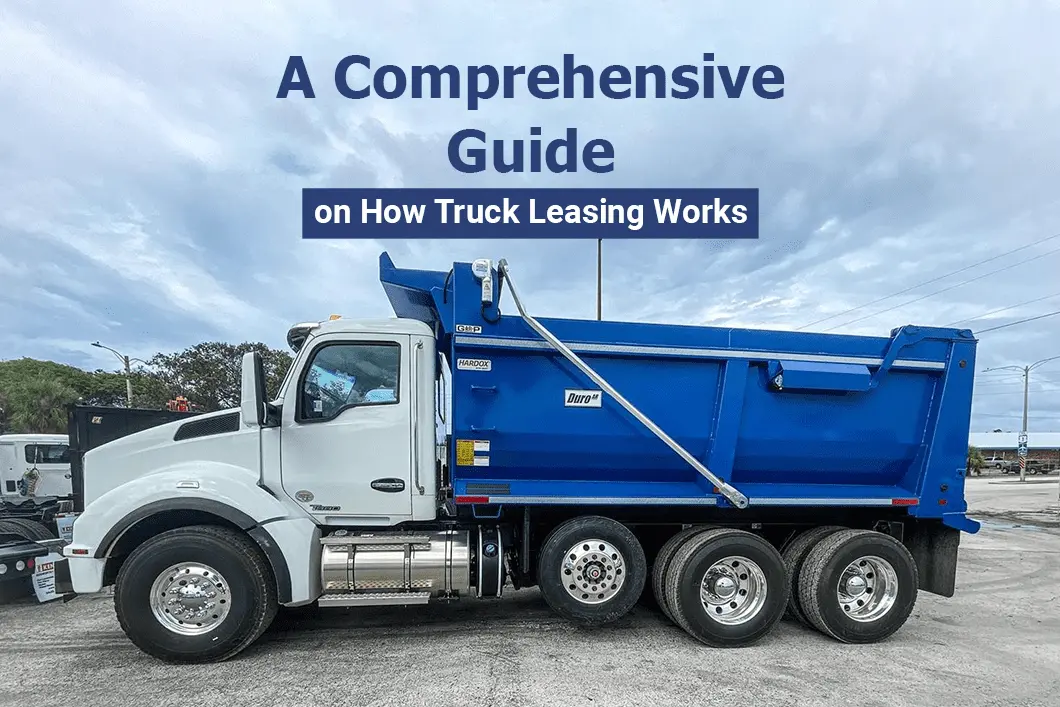A Comprehensive Guide on How Truck Leasing Works
 In the dynamic world of transportation, leasing a truck has emerged as a strategic and cost-effective option for individuals and businesses alike. As the demand for efficient freight movement continues to rise, understanding the intricacies of truck leasing becomes crucial. In this comprehensive guide, we’ll explore how truck leasing works in the Canadian market.
In the dynamic world of transportation, leasing a truck has emerged as a strategic and cost-effective option for individuals and businesses alike. As the demand for efficient freight movement continues to rise, understanding the intricacies of truck leasing becomes crucial. In this comprehensive guide, we’ll explore how truck leasing works in the Canadian market.
The Basics of Truck Leasing:
What is Truck Leasing?
Truck leasing is a financial arrangement where an individual or a company obtains the right to use a truck for a specified period, typically one to five years. Instead of outright purchasing a vehicle, lessees make regular payments to the leasing company, covering the truck depreciation and associated costs.
Who are the Players in Truck Leasing?
1. Lessee: The individual or business obtaining the truck on lease.
2. Lessor: The entity or company that owns and leases out the trucks.
3. Financing Companies: Intermediaries facilitate leasing by providing financial solutions.
Pros of Truck Leasing:
1. Cost Savings: Leasing a truck requires a lower upfront payment than purchasing, making it an attractive option for businesses looking to conserve capital.
2. Fleet Management: For businesses operating multiple trucks, leasing offers the advantage of simplified fleet management. It allows for easy vehicle replacement, ensuring the fleet stays modern and efficient.
3. Tax Benefits: Leasing expenses are often tax-deductible, providing a potential financial advantage for businesses. However, tax regulations may vary, so consulting with a financial advisor is essential.
Understanding the Leasing Process:
1. Vehicle Selection: One of the first steps in leasing a truck is selecting the right vehicle to meet your needs. Considerations include payload capacity, fuel efficiency, and any specialized features required for the intended use.
2. Lease Agreement: The lease agreement outlines the terms and conditions of the lease, including the lease duration, monthly payments, and any additional fees. Reviewing this document carefully and negotiating terms that align with your requirements is crucial.
3. Maintenance and Insurance: Maintenance and insurance responsibilities may fall on the lessee or the lessor, depending on the lease agreement. Clarifying these aspects beforehand helps avoid surprises and ensures smooth operations.
Cons of Truck Leasing
1. Mileage Limits: Lease agreements often include mileage limits, and exceeding these limits may result in additional charges. Lessees should carefully estimate their expected mileage and negotiate terms that align with their usage.
2 .Wear and Tear: Lessees are typically responsible for excess wear and tear on the leased vehicle. Understanding the lessor’s guidelines on acceptable wear is crucial to avoiding unexpected charges at the end of the lease term.
3. Early Termination: Exiting a lease agreement before the agreed-upon term can incur hefty penalties. Lessees should be aware of the potential costs associated with early termination and explore options for flexibility in the lease.
Why should you choose Toplink Loan?
While various companies offer truck leasing services, Toplink Loan is a notable player in the industry. Toplink Loan has garnered a positive reputation among lessees because it is committed to customer satisfaction and transparent leasing practices.
Rapid Approval:
Experience the convenience of securing approval within the same day, ensuring a swift and hassle-free process.
Zero Down Payment Option:
Toplink Loan offers a 0% down payment option, making truck leasing accessible without the burden of a substantial upfront payment.
Sale Leaseback Programs:
Explore innovative sale leaseback programs that provide flexibility and financial solutions tailored to your specific requirements.
No Minimum Credit Score:
Toplink Loan welcomes applicants with no minimum credit score requirement.
Guaranteed Lowest Interest Rates:
Toplink Loan’s commitment to securing the lowest interest rates from well-respected lenders, ensuring cost-effectiveness throughout the leasing term.
No Age Restrictions on Equipment:
Toplink Loan finances both new and used truck trailers or heavy equipment, without imposing any age restrictions based on the year, make, or model.
Diverse Loan Programs:
With a wide variety of friendly loan programs, Toplink Loan caters to applicants across the credit spectrum, from bad to excellent credit, ensuring inclusivity in its offerings.
Conclusion:
Leasing a truck is a strategic decision that requires careful consideration of individual or business needs, financial capabilities, and long-term goals. By understanding the fundamentals of truck leasing, exploring its pros and cons individuals and businesses can make informed decisions that align with their unique circumstances.
Companies like Toplink Loan contribute to this landscape by providing reliable leasing solutions, emphasizing the importance of reputable partners in truck leasing in Canada.
